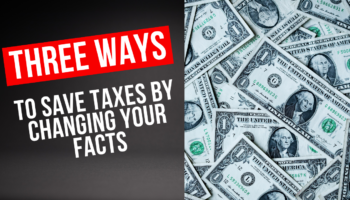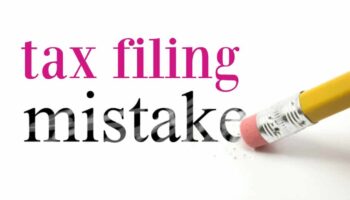Minimize taxes with the tax-efficient plan
There is no doubt that taxes will increase in the coming years with the massive money printing going on right now to provide relief for individuals and businesses suffering financially as a result of COVID19.
These taxes will be major obstacles as you plan to build long-term wealth. Therefore, it is essential that you have a strategy to combat taxes today and in the coming years.
In my book, Tax-Efficient Wealth — The Blueprint to Quickly Build Tax-efficient Wealth to Achieve Financial Freedom in Four Actionable Steps, I discuss that in order to address these obstacles, you need a Tax-Smart Plan.
A tax-smart plan is a simple plan with three key goals:
- Contribute or save money tax-free
- Grow or accumulate money tax-free
- Withdraw or distribute money tax-free
Your wealth can ben enhanced dramatically by arranging your affairs so you can achieve all or some of these goals.
If you consider the likelihood that taxes will continue to increase, you will agree with me that it makes so much sense to invest in an environment where you do not have to pay taxes now or sometime in the future.
Imagine a situation where you’re able to invest with tax-free dollars, allow those investments to grow tax-free, and also withdraw the funds at a future date without paying taxes?
If you’re able to achieve these goals, you can make your savings grow exponentially. And this is how you accelerate your wealth.
So now, let’s examine the plan. The plan is simply to:
1. Eliminate or reduce taxes
2. Convert non-deductible interest to deductible interest
3. Increase cash flow
1. Eliminate or Reduce Taxes
Reducing taxes or eliminating them, where possible, will certainly help you in your journey to financial freedom.
This is where tax planning plays a critical role. Most people do nothing simply because they’ve given into the fact that taxes are complex. Rather than doing nothing, you should consider how to turn these tax complexities into tax savings.
Planning requires you to ask great questions.
How can I sort through the myriad tax credits to find the ones that are right for my situation?
What tax deductions can I take to reduce my taxes?
What do I need to know before buying a house or making a significant investment?
How do I use my RRSP (Registered Retirement Savings Plan) and TFSA (Tax-Free Savings Account) to maximize my tax benefits?
By asking these questions and working with a qualified tax advisor, you will gain a much better understanding of your tax situation and uncover ways you can save on taxes.
Here are a few tips and strategies you can consider to save taxes:
- It is important to know your marginal tax bracket and determine if there are deductions you can take or planning ideas to consider to drop to a lower marginal tax bracket. This can save you taxes.
- Carefully review all tax credits to ensure you’re taking advantage of those that you are eligible for. Often, tax credits are missed. For example, if you’re a first-time homebuyer, you qualify for a one-time non-refundable federal tax credit of up to $750. If you have a service animal to help cope with an impairment, you can claim the related costs as a medical expense. If you’re disabled, you can qualify for a disability tax credit. And starting in 2020, you may be eligible to claim the Canada training credit, a new refundable tax credit, introduced in the 2019 federal budget.
- Take advantage of RRSP and TFSA to reduce or eliminate taxes. Use these tools strategically. For example, if an RRSP will allow you to drop to a lower tax bracket, use it. If you’re starting out in life and have not bought your first home yet, consider maxing your RRSP as much as you can so you can use this as part of your down payment for the purchase. Use tax-free cash to contribute to your TFSA as these investments are not taxed.
- If employment income is your only source of income, consider starting a side business to expand your eligible deductions. If you’re considering a side business, it’s better to look into a business or freelance opportunity in areas you’re passionate to make it less of a job.
- If you’re an employee, in addition to your salary, wages, and bonuses, you’re taxed on the value of the benefits you receive by virtue of your employment. However, certain benefits are tax-free, so it is important to understand these and consider ways you can negotiate with your employer to maximize your benefits.
- If you’re an employee receiving stock options from your employer as a benefit of employment, you can develop an “exercise and sell” strategy for the stock options to ensure you consider cash-flow needs, tax consequences, and investment risk. Without careful planning, you will not maximize the tax benefits of your stock options.
- As an employee, consider the benefits of employee deductions permitted under the Canadian Tax Act. Could you negotiate with your employer to structure your work arrangement to allow you to claim certain employee expenses? Could you negotiate the structure of your compensation to include some commission income so you can claim even more deductions?
- If you’re self-employed or a small business owner, ensure you take advantage of the Capital Cost Allowance (CCA) claims to reduce your taxes.
- If you own a business and have kids, consider getting them involved in your business and paying them a reasonable wage for the work they do. By doing this, you can income split and save on taxes.
2. Convert Non-deductible Interest to Deductible Interest
If you own your home, the mortgage payment you make monthly is a huge obstacle to accelerating your wealth. There are two key reasons why this is a huge obstacle.
First, it is a cash drain. As you know, without cash, you cannot invest to earn returns, and if you don’t have those returns, you cannot deploy them to earn even more returns and thus accelerate your wealth.
Second, the interest on the mortgage is not deductible for tax purposes. As a result, you end up paying more taxes.
Given that the mortgage on your home is the largest debt you have that is non-deductible for tax purposes, one of the greatest ways to tackle this obstacle is to convert the non-deductible interest on your home to deductible interest as quickly as possible.
You can achieve this by renting out a portion of our home as this will allow you to claim a portion of the interest as a deduction in your tax return. In addition to this, you can obtain a re-advanceable mortgage loan and HELOC (Home Equity Line Of Credit) on your principal residence and use this to redeploy the equity in your home for investment purposes. This is sometimes referred to as the Smith Manoeuvre strategy. To learn more about this concept, you can google and find a book on this written by Fraser Smith.
With this strategy of converting your non-deductible interest to tax-deductible interest, you are employing all three of the powerful accelerators I discussed in an earlier article — compound interest, leverage, and velocity. As a result, you have a tremendous opportunity to massively accelerate your wealth.
Why is this concept attractive?
First, you will pay off your mortgage in half the time. You can accomplish this by taking advantage of the up to 20% mortgage prepayment that most banks allow as well as the principal paydown you get from your monthly or biweekly mortgage payments.
However, unlike the regular tax-payer who throws a party to celebrate mortgage freedom, you will be using the otherwise, lazy equity sitting idle and earning no returns to invest in safe and reliable investments earning decent returns.
Second, you will significantly reduce the non-deductible interest you pay on your mortgage. If you look at the interest expense paid on a regular mortgage amortized over 20 years and compare that to the interest paid on a mortgage amortized over 10 years, you will realize that your interest cost can reduce by as much as 50%.
This is significant.
Third, you have access to capital that will allow you to create more assets, and by creating more assets that generate returns, you can now deduct the interest cost to optimize taxes. You can now use the additional returns to create even more assets that will continue to generate more and more cash in the years ahead.
3. Increase Cash Flow
The average taxpayer has an inefficient cash flow pattern, mostly from the inability to structure his or her affairs to convert after-tax expenses to before-tax expenses.
In addition to this, there is more pressure on the average taxpayer’s cash flow as a result of mortgage payments as all the interest costs are significant and non-deductible for tax purposes. As a tax-smart investor, you want to create as much cash as possible as this is the only way you can deploy capital to accelerate wealth. Here are some examples to increase your cash flow:
- Look for opportunities to create income, and more importantly, multiple streams of income that will generate cash flow today. Do you have a skill you can deploy as a Freelancer? Can you write a book and sell it on eBay? Can you set up an online business that can generate income?
- Review your expenses frequently to look for opportunities to conserve cash. Do you pay for subscriptions that you no longer use? Are you paying for a service you can get at a cheaper rate or even for free? Have you considered using money-saving apps to cut down on your expenses?
- Have you looked at your tax situation for opportunities to convert some of the expenses you currently pay on an after-tax basis to before-tax expenses? For example, could you start a business you’re passionate about and deduct regular expenses that can qualify as tax-deductible expenses? Could you hire your kids to work for you and convert some of the kids’ expenses to tax-deductible expenses?
Conclusion
If you want to make progress in building your wealth, you must have a plan to combat taxes and other major obstacles that stand in your way.
And the best way to do this is to use a tax-smart plan.
P.S. I am on a mission to arm you with financial education. That’s one reason I started writing on medium and that’s why I wrote Tax-Efficient Wealth. This book will help you accelerate your wealth in a tax-efficient way. Grab a FREE eBook version of my new book, Tax-Efficient Wealth, to learn how you can build wealth quickly using strategies that will save you a ton in taxes.







